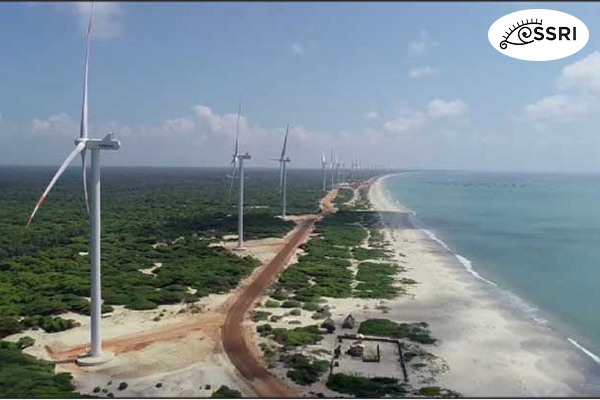On May 16, the Wildlife and Nature Protection Society (WNPS) filed a Fundamental Rights petition at the Supreme Court of Sri Lanka challenging the wind energy project of Adani Green Energy, India, claiming that the project has a high potential to damage the unique biodiversity and pristine landscapes and also lack transparency. The Board of Investment (BOI) accepted this foreign investment project in February 2024 to be established at Mannar and Pooneryn, with a 250 MW capacity for the Mannar project. It is undeniable that Sri Lanka needs a transition to more renewable energy projects to reduce its reliance on coal and other forms of energy that are detrimental to the environment. However, the credibility of such projects becomes more problematic within the local population when such projects that are meant to promote sustainable energy consumption end up causing a negative impact on the environment.
In addition to the 30 turbines currently in place as part of the Thambapawani project, which has already resulted in a shocking amount of bird deaths—many ornithologists consulted on the project had predicted the increase in the number of turbines on Mannar Island to 82 would result in detrimental effect to the surrounding environment. This is particularly alarming as Mannar is home to various native species of water birds and bats, and it is the southernmost point of the Central Asian Flyway, which is frequently visited by countless migratory species. The potential harm to these migratory species and the unique biodiversity of Mannar Island is a serious concern. Further, the Environmental Impact Assessment conducted by the Sustainable Energy Authority of Sri Lanka (SEASL) before the project’s approval was called into question in the petition. While the renewable energy project of Adani Group had already been criticized in Sri Lanka for lacking due process, transparency and potential negative environmental effects, this is the first time a judicial action has been taken against this Indian entity.
Andrew Guzman viewed the behaviour of developing and LDC states as ‘paradoxical behaviour’ because such states wanted to exercise state sovereignty over foreign investment on the one hand and enthusiastically increase the BITs entered with developed countries on the other to incentivize foreign investments. BITs are the dominant international instrument through which foreign investments are regulated. The so-called ‘Hull Rule,’ a customary norm that recognized ‘prompt, adequate, and effective compensation’ for foreign investors, was resisted by developing countries, including Sri Lanka, collectively during the early days. However, developing states endorsed the BITs, which provide increased protection to investors than the hull rule and other customary international law principles, the majority of which are entered with developed countries. Paradox refers to this duplicity in the stance of the developing states.
Concerning Sri Lanka, the first BIT was signed with Germany in 1963, much before the implementation of the open economic policy. Since 1963, Sri Lanka has signed BITs with 29 countries,[1] among which BITs signed with Qatar and Kuwait have yet to come into force. Among these 29 BITs, 14 were signed between 1980 and 1985, demonstrating the country’s exceptional readiness to integrate with the global economy in the wake of the 1977 economic liberalization. According to the UCTAD website, the country has not signed any BITs after the 2012 Qatar-Sri Lanka BIT, indicating a sharp decline in interest in entering into BITs. In spite of standalone BITs, Sri Lanka has entered into several Free Trade Agreements as well to reduce or eliminate barriers to trade and investment. Unlike the FTA entered with India and Pakistan, the FTAs entered with Singapore in 2018, and Thailand in 2024 contain separate chapters on foreign investment.
Here, I argue that the state practice of Sri Lanka regarding the Mannar Power Plant project is paradoxical due to several reasons. The first reason is the continuation of the protectionist economic policy in practice within the country, while the domestic legal framework is drafted in a way to incentivize the promotion of more foreign investment opportunities. For instance, the Constitution of Sri Lanka guarantees the security of foreign investments against nationalization. According to Article 157 of the Constitution, if an investment treaty is approved by the parliament by a resolution with a two-thirds majority, it has legal force, and no written law, executive order, or administrative action can conflict with it unless it serves the national interest of the country. Besides, the Board of Investment Act No. 4 of 1978 and its regulations, Companies Act No. 7 of 2007, Strategic Development Projects Act No. 14 of 2008 as amended, Finance Act No. 12 of 2012, and Land (Restrictions on Alienation) Act, No. 38 of 2014, Foreign Exchange Act No.12 of 2017 and its regulations are among the main legal instruments that encourage the free flow of goods and services and facilitate foreign investments. However, due to certain protectionist state behaviour, the intended objectives of those legislations have still remained untouched. Protectionism means levying tariffs and non-tariff barriers against imports of the country in the ways of taxes imposed by the government, subsidies and import quotas. Foreign direct investments in Sri Lanka are hindered by high protectionist levies, which include import duties and para-tariffs on capital goods. The Value-added tax (VAT) is levied as a multi-stage tax on the incremental value at every stage in the production and distribution chain of Goods and Services, which is charged at 18 per cent now. The presence of para-tariffs such as the Port and Airport Development Levy (PAL) and Special Commodity Levy (SCL) imposed on imported goods has created unwanted investment deterrence, though it provides short-term revenue for the government. Significantly, the more than 500 state-owned enterprises that are engaged in commerce still struggle with corruption, bureaucratic influence, and government meddling.
The second reason to identify the government behaviour as paradoxical is encouraging more Indian investments to be established in Sri Lanka at a time when India has unilaterally terminated India-Sri Lanka BIT. Despite the notable support extended as the regional giant amidst Sri Lanka’s unprecedented economic crisis, since 2021, India has been the largest source of foreign direct investment (FDI) in Sri Lanka. Both leaders have recognized maritime connectivity, air connectivity, energy, and power connectivity, trade-economic and financial connectivity and people-to-people connectivity as the major areas to promote the India- Sri Lanka partnership in the economic sector. Foreign investments are not only associated with opportunities and foreign remittance but also a set of risks. Nonetheless, the frustration over investor-state dispute settlement claims brought against India directed the Indian government to unilaterally terminate around 75 Bilateral Investment Treaties(BITs) on March 22, 2017, including the India-Sri Lanka BIT of 1997, which was largely beneficial for the Indian investors invested in Sri Lanka. Notably, Article 15(2) of the India-Sri Lanka BIT provides that, concerning investments made or acquired before the date of termination, the agreement shall continue in force for a period of 15 years following the date of termination (often referred to as the “sunset clause”). Because of this, only investors who made or purchased their interests in India (or vice versa) before March 22, 2017, can benefit from the protection offered by the Indian-SL BIT. If the Supreme Court decides the dispute of Adani’s project in favour on ecological rights and decides certain limitations or qualifications to be followed for the project owners, and subsequently, if it leads to an investment-state dispute, what are the possible avenues for foreign investors? No BIT provision would be applicable if Adani Group or any other Indian investor found that the state actions taken by the Sri Lankan government violated the investment contract. It is difficult to say how much international investors would be drawn to Sri Lanka’s protracted judicial remedies in this situation, even though the domestic judiciary system of the host state is always open to them. Therefore, it stands to reason that Indian investors would rely on the dispute resolution clause mentioned in the specific investment contract, which makes them more likely to opt for commercial arbitration.
Third, Sri Lanka has already violated the investment agreement entered with India in 2019 regarding building the Colombo East Container Terminal (CECT) due to a significant public backlash at that time. The CECT was strategically crucial for India in monitoring the activities occurring in the Indian Ocean. Concerns were raised about whether India had a strong case to file an investor-state dispute against Sri Lanka for violating legitimate expectations of foreign investors based on the India-Sri Lanka BIT. However, the Sri Lankan government was able to “politically” compromise the situation by hiring the same foreign investor, Adani Group of India, to build the West Container Terminal at Colombo Port (WCT). This leads to reasonable doubt that if changes are to be made to the already approved wind power project, the Sri Lankan government is likely to ‘politically’ handle the situation than legally.
However, if Sri Lanka, as the host state, duly followed the investment screening process prior to the establishment of this foreign investment as an essential procedure to assess long-term sustainability, strategic alignment, and risk mitigation, the above-mentioned paradoxical state practices could have been eliminated. In the investment screening process, the host state sets the regulatory framework, conducts the screening, and makes decisions based on national interests. Investors, on the other hand, should engage in due diligence, ensure compliance, and often adapt their strategies to meet the host state’s requirements. Unfortunately, there is no updated and well-coordinated legislation regarding this in Sri Lanka. The Board of Investment Act of 1980 has specific weaknesses, such as bureaucratic procedure, limited sectoral coverage, lack of coordination between the Board of Investment and other relevant government agencies, and insufficient provisions for environmental and social safeguards. Without addressing these lacunas, the true benefits of foreign investments cannot be achieved. How the proposed Economic Transformation Bill has addressed these concerns is yet to be explored.
Niroshika Liyana Muhandiram
(Niroshika Liyana Muhandiram is a Ph.D Candidate of the South Asian University, New Delhi, India. She has also served as a Senior Lecturer of the Department of Legal Studies of the Open University of Sri Lanka. Her research interest includes interphase between environment and investment, investment treaty arbitration, commercial arbitration and private international law)
References
[1] Australia, Belgium-Luxembourg Economic Union, Italy, China, Czech Republic, Denmark, Egypt, Finland, France, Germany, India, Indonesia, Iran, Japan, Korea, Qutar, Kuwait, Malaysia, Netherlands, Norway, Pakistan, Romania, Singapore, Sweden, Switzerland, Thailand, United Kingdom, United States of America and Vietnam.




